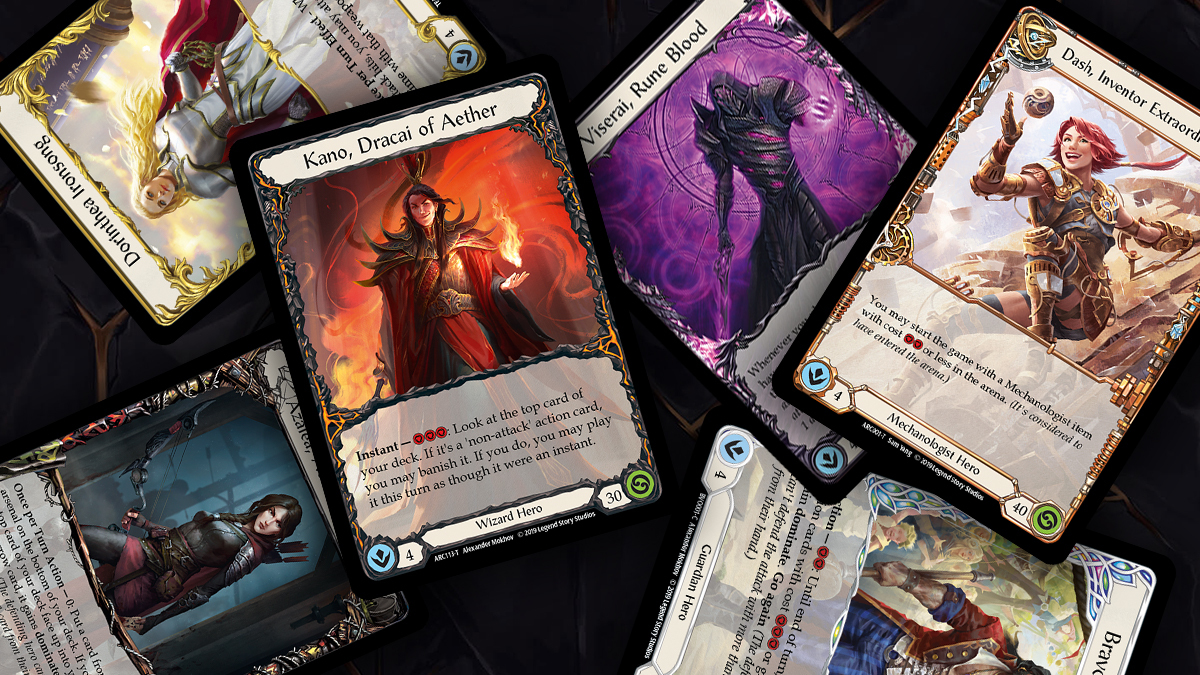Why Flesh and Blood Is A Must-Play Trading Card Game
Could Flesh and Blood be your next TCG obsession? We have a beginner's guide for F&B newcomers.

Presented by: 
Despite the name, Flesh and Blood is a relatively simple TCG that won’t leave you covered in cuts and bruises—not literally, anyway. Hailing from Legendary Story Studios in New Zealand, the game involves pitting your hero against your opponent’s in a back-of-forth game of might and magic, using equipment, abilities, and some plain old wits to get the upper hand and achieve victory. It’s a quick game that values making fast moves and keeping everyone light on their feet until someone reigns supreme.
The basic format of standard play is as follows: you have a hero and a supporting deck of at least 60 cards, of which anything can appear up to three times. At the beginning of a match, you reveal your hero and their equipment to your opponent, and you settle in for a round. An official round lasts 50 minutes, after which if a winner hasn’t been decided, you go three extra turns, before declaring a draw if someone hasn’t been killed yet. Your starting life is based on your hero card, and your playing field has your hero and their weapons in the middle, other equipment to the left, and your deck and graveyard to the right.
This might all sound a little daunting, but in practice it’s easy to pick-up. Thankfully, you can grab quite a few decks and sets online to give you plenty of cards to build your first hero and get practicing.
Dorinthea Ironsong
A warrior hero, Dorinthea’s main ability is swinging again should your first attack land, making her a hefty adversary for anyone. Many of the other cards in the deck support this notion, always keeping you on the offence, and trying to make sure the opponent is on the backfoot. There’s Push Forward, that gives +3 to your next attack, and induces dominate if this is beyond your first assault that turn, meaning your opponent can only with one card, and Ravenous Rabble, an attack whose damage is decided by the top card of your deck.
Besides these offensive capabilities, you’ll get a few rares, too. Flesh and Blood is already cultivating an intense collector’s market, especially hard to come by cards stretching well into the hundreds. Just because something is marked majestic, legendary or fabled, the three highest, doesn’t guarantee a strong price, but it can’t hurt to get a few in your library from the jump. One such majestic associated with Dorinthea is Unified Decree, giving one weapon attack +3, and letting you play an extra attack reaction if your opponent has defended using a card in their hand. For $50, she’ll start you off right.
Buy Dorinthea Irongsong on eBay
Bravo, Showstopper
Along a similar mood is Bravo, a guardian hero that can give dominate to powerful attacks once per turn. Actions in this custom build have the same forward-march mindset as Dorinthea, being all about crushing whatever stands in your way. Crush The Weak is one such example, promising 5 damage, and if it manages to do 4 or more, the opponent’s cards need to have a power more than 3 to work during their action phase. Chokeslam reverberates like this too, if 4 of the attack’s 8 potential damage points land, your challenger can’t increase the power of their attack cards during their turn. Among the rares is Towering Titan, an aura (meaning it stays on the field until it’s destroyed) that destroys the turn after you play it to give one of your attacks +10, potentially pouring some salt in the wounds you’ve been providing.
One of Bravo’s majestics, Spinal Crush, removes “go again” from any of your opponent’s actions, and stops them from gaining it back for a turn. This mechanic is recurring through many cards, replenishing the action point cards cost to play, feeding into the combo system, so disabling that could win you the game. Spinal Crush goes for around $20, depending on where you look, so it’s a decent early upgrade to your collection’s overall worth if you invest, making Bravo’s $50 a strong price.
Blitz Decks
Among the selections of made-up builds, you can grab multipacks of what are called blitz decks. This is a truncated format of classic constructed—standard—that shaves everything down for quicker games. Think of it like speed chess compared to regular chess, where your choices are limited and the idea is for a quick dust up, rather than a long-haul duel to the death.
Blitz decks come in 40 cards, no more and no less, you can only have two of every card, 11 equipment, and your hero is a special young hero, rather than the grand-standing warriors above. Rounds last 30 minutes maximum, pushing you to get the win as early and effectively as possible. It’s a trial by fire format, but good for stretching your knowledge of rules and processes in a slightly less high stakes environment.
You can pick up four of these together for around $40, giving you four young heroes to choose from. One such pack has Kano, a young wizard, Viscerai, a young runeblade, Azalea, a young ranger, and Dash, a young mechanologist, offering four of the six hero types, so you can find the exact kind of hero you want to continue as.
